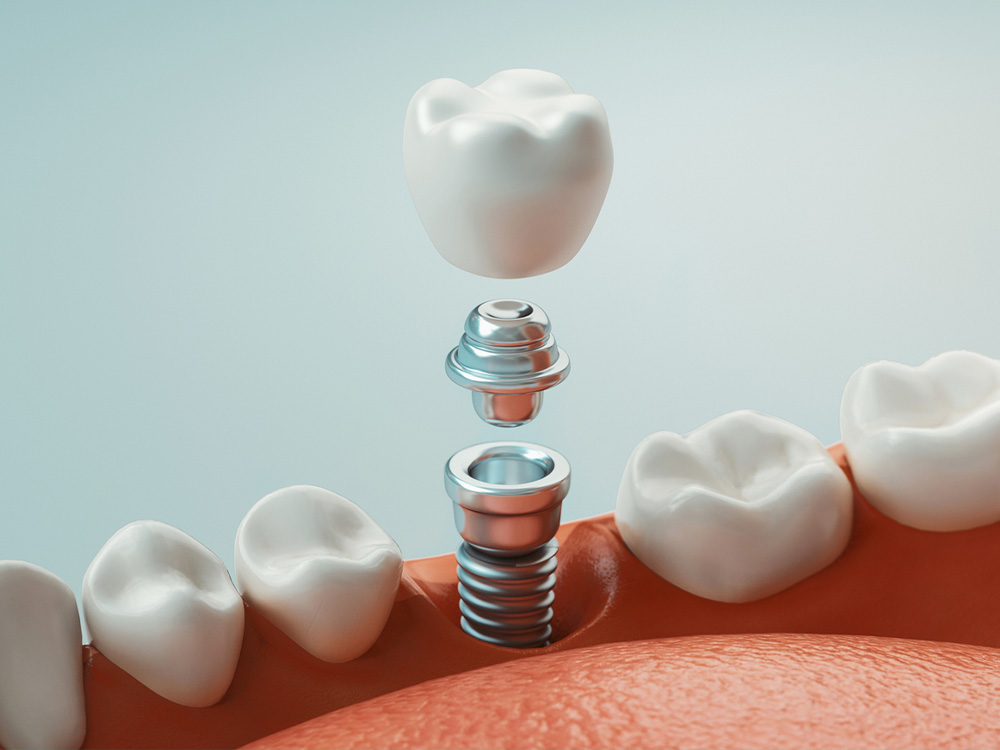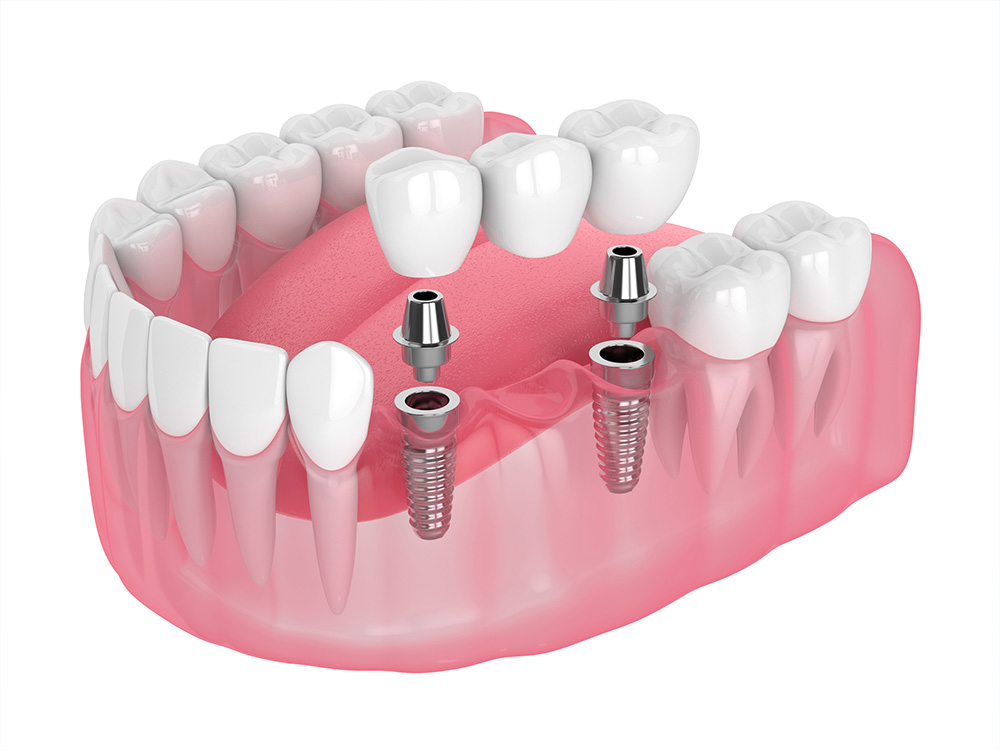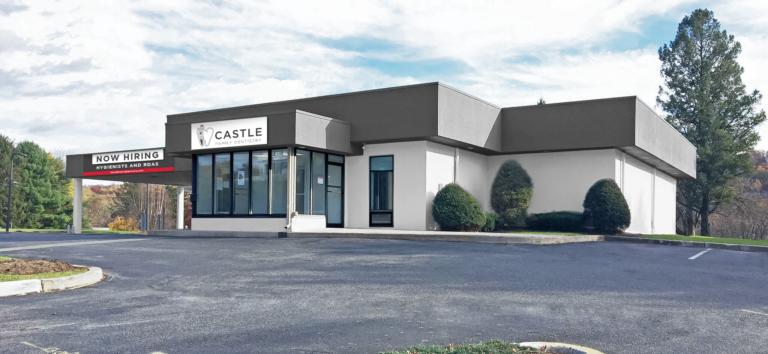Dental Implants
Dental implants offer a reliable and long-term solution for tooth replacement, allowing you to regain normal function and appearance even if you have lost one or more teeth.
Dental Implants in Washington, NJ
Dental implants are special posts of titanium alloy that are surgically placed into the jawbone. This can be done to replace individual missing teeth and partial dentures or to support full all-on-4 implants. These posts act as an artificial root for a crown when they are used to replace individual teeth. Dental implants stabilize bone levels and can prevent bone loss, resulting in better long-term support, function, and aesthetics.
Dental implants require less adjustment or shaving of surrounding teeth than other restoration methods, such as dental bridges. They are more flexible and provide a more natural feeling than dental bridges and partial or full dentures.
Schedule an Appointment Call Castle Family Dentistry

How Much Do Dental Implants Cost?
At Castle Family Dentistry, we provide high-quality, affordable dental care so our patients can always receive the treatment they need. The cost of dental implants can vary based on the materials used, insurance coverage, and other factors, such as whether bone grafts are required. Our office is always happy to provide you with estimates on the cost of a procedure after your initial consultation.
We know many patients are concerned about cost, payment plan options, and insurance coverage when considering dental implants. Our staff is happy to work through these concerns with you so you can get the care you need. Many patients without insurance join our Castle Family Dental Savings Plan to reduce the cost of their procedures.
Learn About Our Dental Savings PlanDental Implant Process at Castle Family Dentistry
- Consultation & Exam. To determine if dental implants are the proper restoration method for you, we will conduct a thorough exam, including a 3D scan for placement planning, a discussion about your surgical guide for placement, and overall treatment options.
- Tooth Extraction & Bone Grafting. We will schedule the procedure after establishing a treatment plan if teeth require extraction. After tooth extraction, the site needs recovery time to ensure it is ready for the implant procedure. If necessary, any bone grafting to support the implant will occur, which takes a few months to heal.
- Implant placement. The implantation process can begin once the site is ready. The implant is placed into the jawbone, and a healing cap is placed over it. Regular check-ups are necessary to ensure proper healing.
- Implant healing. After implant placement, osseointegration starts when the jawbone heals around the dental implant, providing a solid base for your new artificial tooth. This process takes around 3 months.
- Abutment & Crown Placement. Once healing is complete, the abutment, connecting piece, and a replacement tooth or crown can be placed.
Common Questions About Dental Implants
-
Are there any aftercare instructions for dental implants?
After placing a dental implant, it is crucial to avoid disturbing the placement site. This means refraining from chewing near the implant. The area requires gentle cleaning for several weeks to a month after placement. The dental implant takes a few months to fuse to the jaw, so minimizing any disturbances during that period is best. If you have a temporary denture to replace your missing teeth, ensuring it does not rub against the surgical site is essential.
After the implantation, extraction, or grafting, you may experience typical discomforts associated with oral surgery. These might include swelling, pain at the site, and minor bleeding. Here are some specific recommendations for the first two weeks after any procedure to ensure proper healing and recovery:
Pain Management. Ibuprofen is recommended to reduce pain and swelling after surgery.
Oral Hygiene. Gentle brushing is crucial to keep the recovering area clean and avoid irritation from overly aggressive brushing. Warm salt water rinses can also help keep the area clean while reducing pain and swelling.
Minor Bleeding. After oral surgeries, it's common to have a small amount of blood in your saliva for a day or two. Gently biting on a gauze pad for 30 minutes can help with this problem. If bleeding continues over a few days, please get in touch with your dentist's office.
Swelling. In addition to ibuprofen and saltwater rinses, periodically using an ice pack on the cheek near the affected area can help.
-
How long do dental implants last?
Dental implants are an effective and long-lasting solution for missing teeth. The implant post-fuses with the jawbone and should not require any replacement unless there are rare complications. However, the dental crown attached to the implant may last 10 to 30 years and require the same care as natural teeth. Brushing twice a day, flossing, and regular dental checkups can help prolong the lifespan of your crown.
Although dental implants are generally safe, there is a slight chance that they may fail to integrate with the jawbone and require removal. Certain medical conditions may increase the risk of implant failure. As with any surgery, there is also a potential risk of surgical complications during the dental implant placement.
At Castle Family Dentistry, we provide our patients with thorough post-operative instructions and a maintenance care contract that acts as a warranty on the implant if the contract is followed.
-
Are dental implants painful?
The most painful part of the dental implant process is extracting any teeth that implanted crowns will replace. However, any extraction will include anesthesia meaning little to no pain during the procedure and only a few days of recovery. Any pain experienced during recovery should also be manageable using over-the-counter medications such as ibuprofen.
-
How do I know if I need a bone graft?
If you're planning to get a dental implant and don't have enough bone to support it, you may need a bone graft. If you require a dental bone graft, you'll need to consult with your dental implant specialist. However, the chances of needing a bone graft are higher if you have lost one or more teeth and still need to replace them. When you lose a tooth, your bone starts to recede gradually. Similarly, if you've noticed a change in your jaw shape over time, that can also be a sign of oral bone loss.
Ready to Schedule or Want to Learn More?
Are you ready to enjoy your favorite foods and no longer be in pain? Call our office or you can book your consultation online today!
Contact Castle Family Dentistry View All Services Schedule an Appointment
